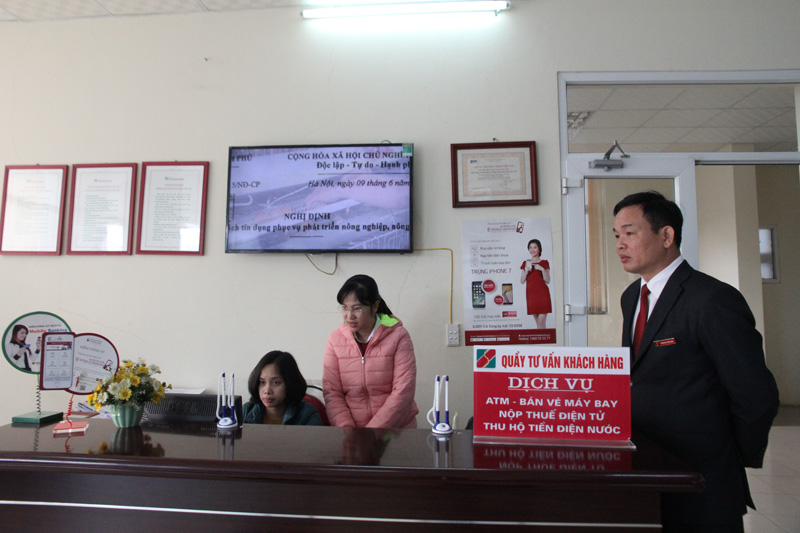
(HBO) – The State Bank of Vietnam (SBV)’s branch in Hoa Binh province has issued a plan to promote payments for public services via banks.
 Agribank’s Song Da branch
(Hoa Binh city) provides consultancy for customers about online payments of
tax, electricity and water bills.
Agribank’s Song Da branch
(Hoa Binh city) provides consultancy for customers about online payments of
tax, electricity and water bills.
In Hoa Binh province, cashless payments are
mainly applied at local trade centres and via automatic debit, transactions at
ATM, POS, internet banking, mobile banking, and e-wallet. Customers could pay
electricity and water bills at some supermarkets and trade centres as well as
buy products through the Internet.
The SBV branch in the province is stepping
payments for public services via banks. This is one of the key solutions to
improve the local business environment and competitiveness in 2020 with
orientations to 2021.
It is also building a plan under which
commercial banks are requested to push ahead with administrative reforms and
make it easier for businesses and local residents to get access to banking
services. Organisations and individuals are expected to change their habit of
paying in cash.
The SBV branch hopes to increase the
transparency of payment activities in the economy and personal incomes in society,
as well as contribute to the prevention of corruption, negative phenomena and
economic crime.
Commercial banks in the province have
coordinated with relevant units to provide public services to achieve specific
goals. For example, 100 percent of schools, education facilities, hospitals,
medical centres, and general clinics will accept tuition and hospital fee
payments via banks. All electricity and water suppliers will allow households
and individuals to pay bills through banks.
The province also aims to promote e-payment in
e-commerce, introduce payment forms via banks for supermarkets, restaurants,
shopping centres, and distribution facilities./.
After more than four years of implementing a project launched by the Hoa Binh Party Committee’s Standing Board on developing agriculture and promoting product consumption linked with building new-style rural areas for the 2021-2025 period, the province’s industry and trade sector has made significant strides, greatly contributing to local socio-economic development.
Luong Son district has identified 2025 as the year for the accelerated breakthrough to successfully implement the socio-economic development plan for the 5-year period from 2021 to 2025. The district has been focusing on executing the plans and trying to achieve a GRDP growth rate of approximately 15%.
Since the beginning of this year, under the direction of the Department of Agriculture and Environment, the Sub-Department of Agricultural, Forestry, and Fishery Product Quality Management has strengthened the integration of the professional activities to promote and guide the organizations and individuals in the production and trading of agricultural, forestry, and fishery products to comply with the legal regulations regarding the use of chemicals, pesticides and veterinary medicines in crop cultivation, livestock farming and aquaculture. They also provide guidance to processing and manufacturing establishments on keeping the records to trace the product origins and using food additives from the approved list according to the regulations.
Hoa Binh province saw a significant rise in state budget revenue in the first two months of 2025, heard a meeting chaired by Vice Chairman of the provincial People’s Committee Quach Tat Liem.
Ha Thi Ha Chi, a 26-year-old graduate in law, has taken an unconventional path by returning to her hometown in Mai Chau district to establish the Tong Dau Cooperative, creating stable jobs for local women and bringing Thai ethnic brocade weaving to the global market.
As the Lunar New Year 2025 approached, pork prices surged, creating a profitable season for farmers in Tan Vinh commune, Luong Son district. Taking advantage of the rising demand, Can Minh Son, a farmer from Coi hamlet, sold over 30 pigs at 69,000 VND/kg, each weighing more than 100 kg. After deducting expenses, his family earned a profit of over 50 million VND.



 Agribank’s Song Da branch
(Hoa Binh city) provides consultancy for customers about online payments of
tax, electricity and water bills.
Agribank’s Song Da branch
(Hoa Binh city) provides consultancy for customers about online payments of
tax, electricity and water bills.